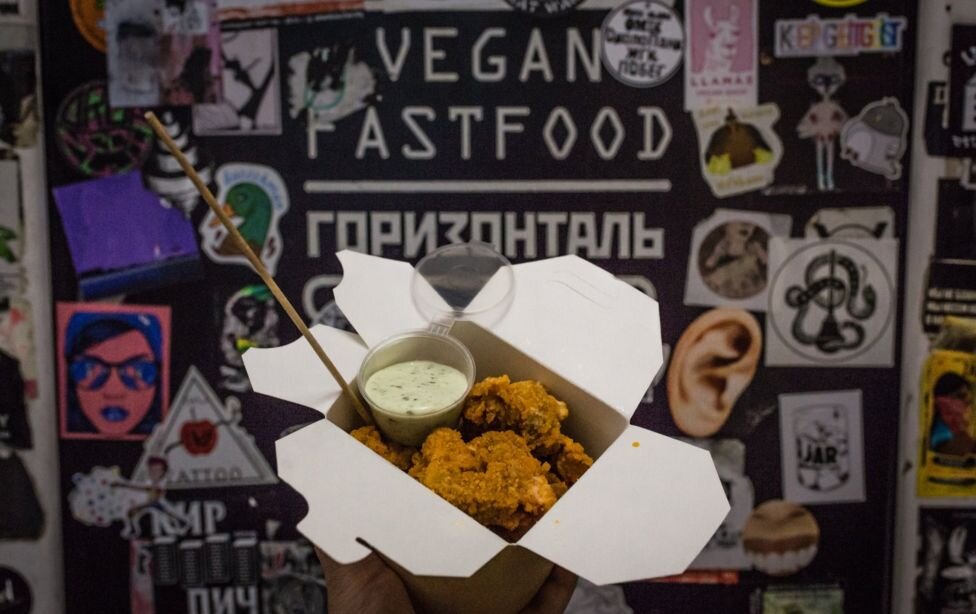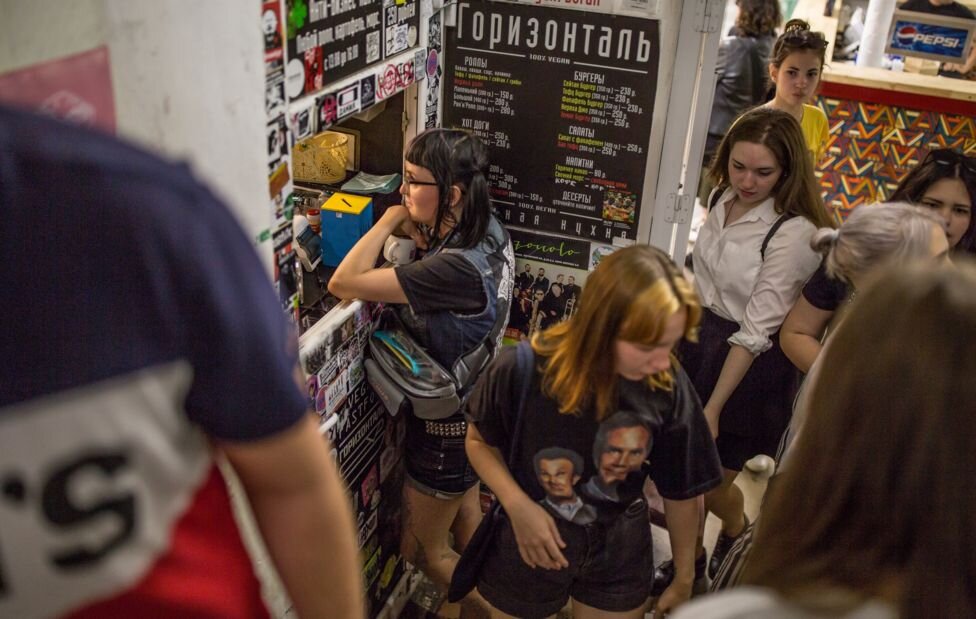Food revolutionaries: Veganarchists in St. Petersburg, and the return of the Diggers to the fields of England
from BBC
Food - as the means to radicalise people about their identities, localities and the planet - is a powerful vector of change these days. Here’s two stories: one from the frontiers of veganism, the second reviving a very old idea in a new context. They start from the stomach, and from there seek to build a part of the new system that’s coming.
The St Petersburg anarchists cooking up a vegan revolution
This long BBC website feature is a brilliant example of how food culture offers an everyday, intimate empowerment that can survive and flourish, even under the most probing and oppressive political regimes. But what helps is that vegetarianism has a long tradition in Russia too:
As Russia enters its 20th year under the authoritarian leadership of Vladimir Putin, St Petersburg's vegan anarchist community thrives. Hated by the far right and out of tune with Russia's prevailing nationalist mood, the activists have created a version of what their ideal society would look like - and they're promoting this vision with delicious food. Could they be changing attitudes among other young Russians?
Once a month, the eight people who work at the Horizontal takeaway hold a meeting in which they air any grievances, discuss updates to the menu, and vote on any changes they may want to make. The front of their restaurant, a hole-in-the-wall that serves vegan burgers, hot dogs and nuggets to go, is covered with stickers promoting anti-fascism, anarchism, and other vegan outlets in the city. Their meal deal offer, something commonly called a "business lunch" in Russia, is called "the anti-business lunch".
Lately, the group has been discussing whether or not to change location - the complex they're currently based in holds shows featuring captive animals, which they believe are cruel and exploitative.
Although some of them have been working there for longer than others, all eight members of the team have an equal say within the business. There are no managers and no hierarchies. Varya, 26, has been at the restaurant the longest.
"That's why we're called Horizontal - because every person who joins our restaurant is on the same level, and has the same rights and an equal position with all of the others," she says. The restaurant adheres to the principles of anti-racism, feminism, LGBTQ+ rights, the abolition of borders, and animal liberation. In a country where people who are gender non-confirming or trans are shunned, and even sometimes attacked, Horizontal is a space where anyone's preferred pronouns will be respected.
The group is planning to compose a manifesto of sorts stating what its values are, to make sure any new starters are on the same page. "For us, it's important that people who join us hold similar ideology, that they share our views, and that they understand what 'veganism' really means to us," Varya says.
Horizontal is one of about a dozen similar spaces across St Petersburg, promoting vegan anarchism - "veganarchism" - by cooking up delicious vegan food.
The term "veganarchist" was coined by the New York-based anarchist Brian Dominick in his 1997 essay, Animal Liberation and Social Revolution. In it, he writes that veganism is inherently intertwined with anti-fascism, human rights activism and anti-capitalism.
The animal slaughter that vegans and vegetarians are consciously opting out of, he says, relies on systematic exploitation of both humans and animals - and that only by fighting all injustices together can a vegan truly fight against any of them.
This fight, he suggests, can be waged through individual actions and radical lifestyle changes.
"The role of the revolutionist is simple," Dominick writes. "Make your life into a miniature model of the alternative, revolutionary society you envision. You are a microcosm of the world around you, and even the most basic among your actions affect the social context of which you are a part. Make those effects positive and radical in their nature."
But although the word "veganarchism" came from the US in the late 20th Century, both anarchism and meat-free diets have a long history in Russia.
The Russian Orthodox church prescribes a plant-based diet during Lent, and most traditional restaurants still offer a plant-based "Lenten menu". Ethical vegetarianism, meanwhile, was thriving in pre-revolutionary Russia - partly because of the example set by the novelist Leo Tolstoy in the late 19th Century.
But for much of the Soviet period vegetarianism fell out of favour, seen as a bourgeois indulgence. The Great Soviet Encyclopaedia went as far as to proclaim that "vegetarianism, which is based on false hypotheses and ideas, does not have followers in the Soviet Union".
Today, only 1% of Russians say they are vegetarian, according to a Vtsiom poll from 2018 - roughly the proportion of British people who are vegan.
As for anarchism, the 19th Century Russian philosophers Mikhail Bakunin and Peter Kropotkin are considered two of the most influential thinkers in anarchist history.
Kropotkin's radical 1892 text, The Conquest of Bread, continues to influence anarchists around the world to this day. In it, he says - among other things - that one of the first steps in any anarchist revolution would be for the people to seize food and the means of producing it.
"We have the temerity to declare that all have a right to bread, that there is bread enough for all, and that with this watchword of 'Bread for All' the revolution will triumph."
Digging for ideas: what can we learn from the Diggers?
We’re finding thoughtful heads of strategy from London local councils these days - Simon Parker (from Redbridge Council) gave us his utopian picture of local communities a few weeks ago.
And here’s Noel Hatch (@noelito on Medium and Twitter), head of strategy (communities) at Camden Council, bringing back to our attention a fascinating pamphlet on the 17th century Diggers movement, written by the innovation consultant Charlie Leadbeater.
In this Medium blog, Noel sees that the Diggers are directly inspirational - by their confidence in claiming land for food - and metaphorically, in terms of how we spread innovative ideas around a locality:
Let’s turn to the core tenet to the Digger’s plan; “groups would plant and tend crops, and feed and sustain themselves, by taking unused land into common ownership to boost food production and provide employment”.
Much has changed since the 17th century, but in many ways we are slowly returning to these practices, more urgently in some cases than others, although examples like People’s Supermarket, FARM:Shop and the Incredible Edible Todmorden prove that it can be done in a less…brutal way.
Leadbeater describes how collaborative innovation was just as much at the heart of the debate in the 17th century as it is now:
The Levellers wanted to raise food production through mutual ownership of underused land that would allow new technologies like manuring to take hold. One of the key issues for our generation is how best to share socially useful knowledge, especially through digital technologies and the web.
In an allotment, as with communities, the first thing you have to do is plant seeds. But should we carry on the analogy? Do you need to wait for the right conditions to plant your idea — in the good times when everyone is up for a brainstorm? Or is it when there is a frosty crisis like we’re in at the moment that new ideas are most in need?
Ultimately what’s most important is to make sure your seeds turn into fruit or veg is to nurture them — to water them regularly, place them in the sun and protect them when the frost comes. The soil too needs to be nourished, even after the crops have been dug up so next year they can have a fertile ground to grow.
Just like a juicy tomato, you need to do the same with ideas. But to return to the initial argument of Digging for the Future in the context of innovation: you also need to do the same with people if they are to be confident and empowered to innovate.
What have we forgotten with this analogy? What’s unique with allotments is that they’re communal. People join one another over a shared passion. They come back regularly to gossip about how their crops are growing. They share tips for newcomers and sometimes even compete for prizes, like who grows the biggest marrow.
It’s why people warm to initiatives like Co Lab Dudley, Transition Town Totnes and The Open Works. It’s also why it’s so important - particularly when it’s the institutions putting in new soil (like “community rights”) - that people are helped to learn how to nourish the soil. They need to take advantage of the opportunities of the seeds they plant, to be able to grow - and not be killed off in the first frost.
How can we encourage this within organisations and maybe even more importantly between institutions and the people they’re designed to serve? So that institutions can act more like “gardeners” than “umpires”?
More here. And one final bit of inspiration from Leadbeater’s pamphlet Digging for the Future: An English radical manifesto. It was written and published in 2011-12, but feels much more relevant to the present moment:
From Culture Matters, “A common treasury for all: Gerrard Winstanley and the Diggers”
The New Levellers – social entrepreneurs, open source hackers, grass roots political campaigners, civil libertarians and environmental innovators – operate in the margins.
Yet, even so, a synthesis of ideas is emerging that could redefine mainstream politics based on a series of fundamental corrections to ultra free market, environmentally unsustainable financial capitalism, governed by an enterprise state with declining legitimacy and a welfare state of declining efficacy
Those digging for the future corrections would mean shifting:
from a prime focus on attracting entrepreneurs and financial capital, to seeing the life chances of the poorest as the prime measure of social and economic progress
from a welfare system based on services that maintain dependence, compensation after the event and cheques in the post, to one that invests in capabilities, focuses on prevention and engages as many people as possible to be contributors in seeking solutions
from the private exploitation and hoarding of knowledge, to sharing and collaboration as the engines of innovation and growth, based on the presumption that all knowledge and culture should be available for sharing
from propping up the exhausted, low energy parliamentary politics, to a high-energy politics based on a new constitution of the state which itself is based on high levels of citizen engagement
from linear industrial, high-energy systems, based on doing things to the environment, to circular, low energy and low waste systems, designed for zero waste working with natural systems
from the ultra individualism of “i want”, to the collaborative individualism of “We can”, in which the quality of relationships rather than units of individual choice are at the heart of a good society
from the constitution of the individual through self-willed choice, to a conditioned freedom in which people are made by the relationships that connect them
from the idea that we are what we own and control, to the idea that we are what we share
from financially driven, shareholder value capitalism, to a variety of ways in which organisations can own, connect and trade, in a more plural, social, democratic and innovative economy.





